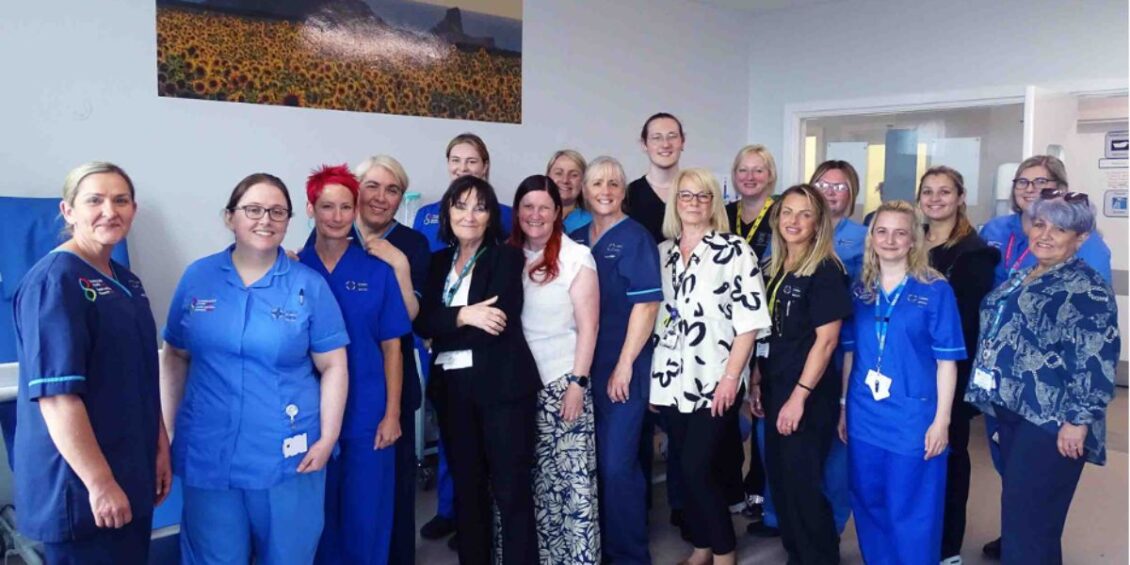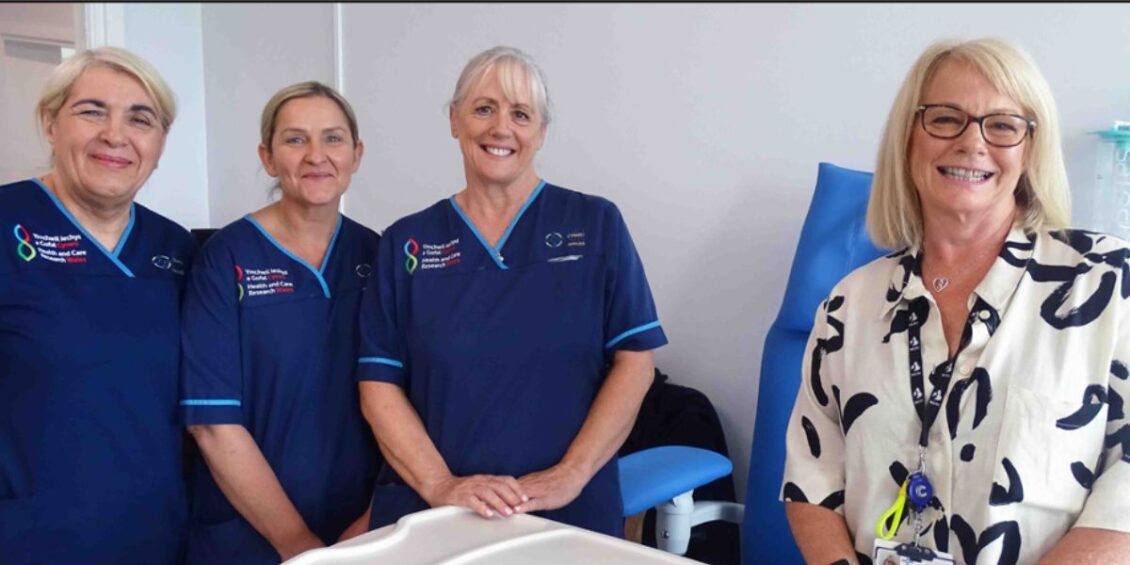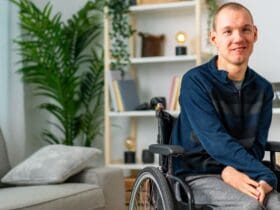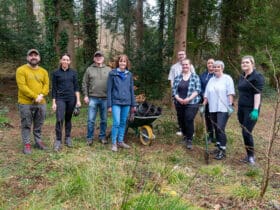An award-winning team that has helped revolutionise cancer treatments around the world has moved into a purpose-built new home in Swansea.
For the first time, the research team based in the Cancer Institute at the city’s Singleton Hospital has a dedicated clinical suite where it can carry out a range of oncology and haematology trials.
Previously it had to find space around the hospital, including the Chemotherapy Day Unit (CDU), which was already busy treating patients.
The two-room suite is located within Ward Nine and sits alongside the CDU, which moved there last year. It means that patients taking part in trials have a dedicated space and can now be seen in one location.
The South West Wales Cancer Centre at Singleton provides the infrastructure for the research delivery team, together with cancer and haematology clinicians, to run various UK and global trials.
There can be 30 of these running at any one time. Many have led to huge strides in cancer treatments, with Swansea’s success recruiting patients making it one of the UK’s leading sites.
Medical oncologist Professor John Wagstaff, who arrived in Swansea in 2003 as part of the development of Swansea Medical School, has played a significant part in this success.
Professor Wagstaff, who retired in 2022 but still does part-time work there, officially opened the new clinical trials suite.
One of the rooms has four treatment chairs for patients participating in the various trials. The other provides a private space for patient examinations, assessments and one-to-one discussions.


Both rooms also feature artwork donated by Wezley Siddons of Emerge Sign and Print, creating a more homely look.
During the launch, Professor Wagstaff, now Emeritus Professor of Oncology at Swansea University, spoke of the many important clinical trials the team had participated in, referring to two in particular.
One, called Stampede, for men with prostate cancer, started way back in 2005. “The trial completed recruitment last year and, when it closed, it had recruited 11,999 men with prostate cancer,” said Professor Wagstaff.
“It was the largest prostate cancer trial that has ever been conducted in the world and it’s probably one of the largest randomized trials that has ever been done in oncology.
“We were very active in recruiting to that and just this year we were awarded a prize for being one of the top recruiting centres in the UK.”
The trial, he said, had changed the treatment of men with prostate cancer around the world, having a huge impact on survival rates.
This was also true of another trial which focused on metastatic melanoma, skin cancer that has spread to other parts of the body.
“It recruited in 2013-14,” said Professor Wagstaff. “Ten years ago, the treatment of metastatic melanoma was really difficult. It’s a very aggressive form of cancer.
“The average survival time was around 10 months. Very few patients survived more than 10 years.”
The treatment available back then had a 10-year survival of between 20 and 25 per cent of patients. However, more than seven years on, almost half of the patients who took part are still alive.
“We were the second highest recruitment centre in the UK for that trial and the fifth highest in the world,” said Professor Wagstaff. “That is a huge achievement.”


Jayne Caparros, currently Research Delivery Manager, has seen the cancer R&D work at Singleton grow over the years. She became its first research nurse in 1997.
“The post was funded by two consultants who were running a couple of trials,” she said.
“When we started we had nothing. We didn’t even have an office. I shared a room in the old CDU with the clinical nurse specialist for chemotherapy.
“I spent half my time there and half standing in the secretary’s office in the radiotherapy outpatients department.”
Built following a £1 million charity appeal run in conjunction with the South Wales Evening Post, the Cancer Institute became the home for the expanding research delivery team – as well as three oncology professors working with the oncology department and Swansea Medical School.
Huge improvements were also made to the radiotherapy department, CDU and the breast unit, followed in 2004 by the opening of the South West Wales Cancer Centre.
Funding from the Welsh Government via the Wales Cancer Research Network, now Health and Care Research Wales, has supported the growth of cancer research in the health board.
The cancer R&D team now consists of research nurses, officers, radiographers and admin staff.
However, the extra capacity for clinical trials this expansion created also left the team having to use a variety of locations, including clinics, the CDU and the radiotherapy department. Now all that is changing.
The new suite will make a massive difference to the team’s work but also, ultimately, to patients.
“When we look back on what treatments were available back then, they are far more targeted and specific now,” said Jayne.
“People are doing much better because there are a lot more choices of treatments available. We have witnessed that happening, which is lovely.”
Dr Nicola Williams, National Director of Research Support and Delivery at Health and Care Research Wales, said: “The launch of this new clinical trial space at Singleton Hospital is another example of how the importance of research within hospitals is increasing here in Wales.
“Swansea Bay University Health Board is one of many health boards now with a dedicated space to ensure we can contribute significantly to national and global studies, to stay at the cutting edge of health and social care.”
He said the new suite would allow them to take part in similar trials without having to rely on the CDU, which was already extremely busy.
Jayne Caparros, currently Research Delivery Manager, has seen the cancer R&D work at Singleton grow over the years. She became its first research nurse in 1997.
“The post was funded by two consultants who were running a couple of trials,” she said.
“When we started we had nothing. We didn’t even have an office. I shared a room in the old CDU with the clinical nurse specialist for chemotherapy.
“I spent half my time there and half standing in the secretary’s office in the radiotherapy outpatients department.”
Built following a £1 million charity appeal run in conjunction with the South Wales Evening Post, the Cancer Institute became the home for the expanding research delivery team – as well as three oncology professors working with the oncology department and Swansea Medical School.
Huge improvements were also made to the radiotherapy department, CDU and the breast unit, followed in 2004 by the opening of the South West Wales Cancer Centre.
Funding from the Welsh Government via the Wales Cancer Research Network, now Health and Care Research Wales, has supported the growth of cancer research in the health board.
The cancer R&D team now consists of research nurses, officers, radiographers and admin staff.
However, the extra capacity for clinical trials this expansion created also left the team having to use a variety of locations, including clinics, the CDU and the radiotherapy department. Now all that is changing.
The new suite will make a massive difference to the team’s work but also, ultimately, to patients.
“When we look back on what treatments were available back then, they are far more targeted and specific now,” said Jayne.
“People are doing much better because there are a lot more choices of treatments available. We have witnessed that happening, which is lovely.”
Dr Nicola Williams, National Director of Research Support and Delivery at Health and Care Research Wales, said: “The launch of this new clinical trial space at Singleton Hospital is another example of how the importance of research within hospitals is increasing here in Wales.
“Swansea Bay University Health Board is one of many health boards now with a dedicated space to ensure we can contribute significantly to national and global studies, to stay at the cutting edge of health and social care.”








Leave a Reply
View Comments